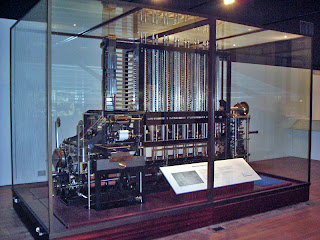Credit for the concept of the
modern computer goes to the British mathematician Charles Babbage who in the
1830’s designed a steam-powered ‘analytical engine’ that worked with punch
cards. Although Babbage worked for decades at perfecting his design, he never
built the machine.
In the 1880’s, American inventor
Herman Hollerith developed a ‘tabulator’ to manipulate data on punch cards. The
device was used to compile data from the 1890 census in less that two months
compared to the more than seven years it took to compile data from the previous
census by hand!
In 1848 George Boole, another
British Mathematician, developed a system of binary logic in which all question
could be answered a “true” of “false” It was almost a hundred years, however,
before a computer was developed based on binary numbers using Boolean logic or
Boolean algebra.
Until the late1930’s, calculators
or computers were based on the decimal system, mechanical devise that required
hundreds of moving parts. The transition to binary logic allowed the use of
electrical circuitry, that is, switches that were turned on or off, to perform
complex calculations.










0 comments:
Post a Comment